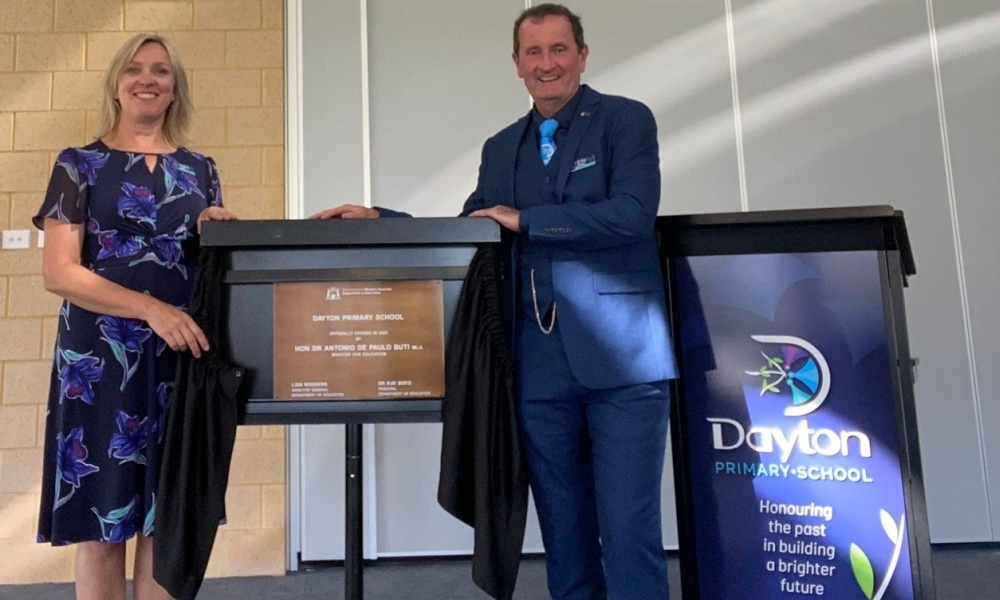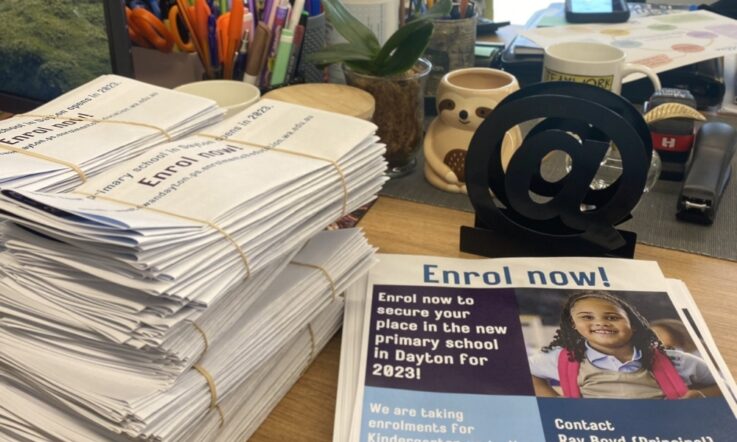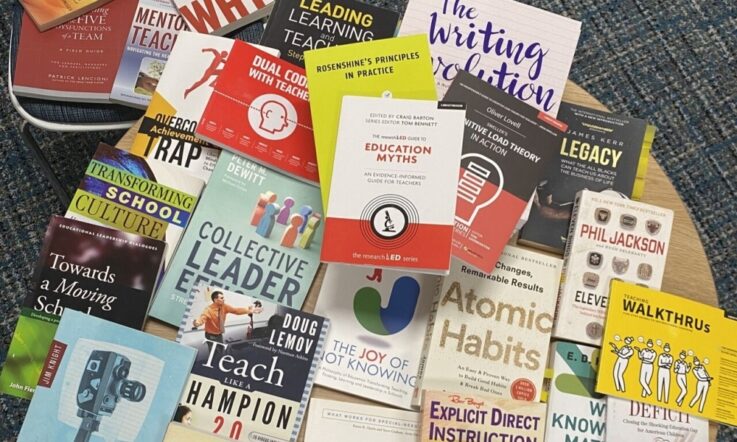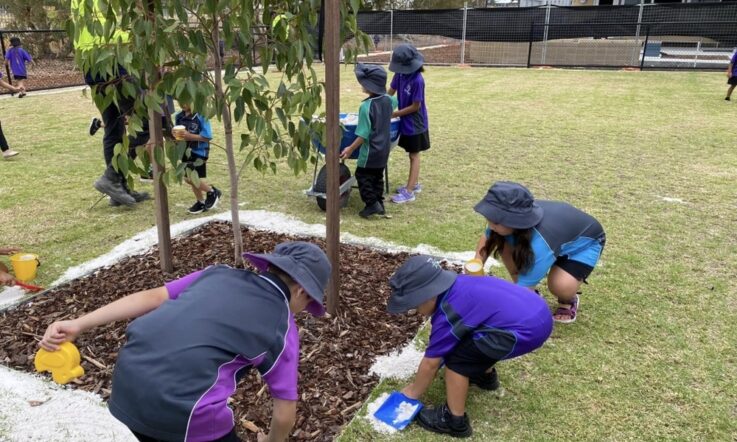This podcast from Teacher magazine is supported by the QT Academy. Visit QTAcademy.edu.au to find out more.
Thanks for downloading this podcast from Teacher – I’m Jo Earp. School Assembly is the podcast that explores what it takes to build a new school from the ground up. In Series 1 we’re following Principal Dr Ray Boyd and Associate Principal Rachael Lehr as they navigate the exciting and challenging journey. Each month, we touch base for updates and reflections on their progress in the newly developing suburb of Dayton, located in the eastern metropolitan city of Swan in Perth, Western Australia.
Well, we’ve reached our series final. In this episode Ray and Rachael reflect on the events of the last 18 months – including achievements, anxieties and imposter syndrome – and look to the future for Team Dayton. I hope you enjoy it.
JE: Ray and Rachael, welcome to the final episode of this series. I've not got a particular theme for this one, but I thought we'd start off talking about the actual podcast itself. So School Assembly, for those people, if this is your first episode, we've been following you through the experience of building up a school and a community – so, you know, the teachers, the students, the parents, the wider community involvement, all from scratch. We've gone through lots of different topics during the last 10 episodes. I'm interested in what you've found useful, both of you about the whole podcast experience.
RL: Well, speaking for myself, Jo, I actually found it really great just to actually force me to reflect on what's happening. It's been a crazy busy time, so just having that time just to sit and reflect on what's going well, what we're feeling proud of, what our challenges are, it's actually been really great, just to help me with the whole journey.
RB: And I tend to journal anyway, so reiterating what Rachael's just said, this provided an opportunity to not just reflect in a different way, but actually to have someone guide and dig deeper into that reflection, I found extremely useful and enjoyable too, by the way.
JE: That's good because we don't want it to be a bad experience, do we, we want it to be an enjoyable experience. The other thing was, I thought, sort of putting aside the rest of the team and the community – and it is a team effort and, you know, you've said that all the way through… I'm not sure if it's possible to actually do this, but can you think about what it felt like personally before you actually started, and maybe what your own expectations were, maybe your anxieties were then, and then how the reality so far has compared to that?
RB: Yeah. For me, in the first instance, the expectations were always high in terms of what I wanted for myself, and then what I wanted for people who actually joined the team. But, sitting in a room, an empty room, on the first day of the gig was certainly something that created a high level of anxiety, given that at the time we couldn't even get the computer on the system! As a former athlete, though, when I prepared for races or in training, what I'd try and do was prepare for situations that may eventuate – because you can't control the weather, you can't control what people do, but you can control how you react. So, in in that sense, it's no different to what I was doing as a leader. I've developed as a teacher and a leader, so the skill set I've got, I know is there and I still plan for what may or may not happen. I still acknowledge there’s going to be things out of my control, and I wondered often if I'd be good enough for the gig once I was actually standing on the line – or in this case, sitting in the seat. But that said, the moving parts certainly had me juggling more elephants than I’d actually anticipated.
RL: Yeah, and for me it was similar in the sense of, I guess it was just a really big unknown. So, I felt like I was taking a really big chance on something and wasn't even sure what that would look like. So there was some sort of anxieties about that, not knowing what would actually be involved, not ever having done it before. But I feel like at this point in time, well, it's over a year that I've been in the role but 6 months into our new school here now at the end of our first semester, I feel like it's come together really well. It's probably more than I expected it to be, in that regard. It's been an amazing journey – it's been a hard journey, but it's been really amazing. So I'm glad I took the chance.
JE: I mean, looking from the outside and sort of following you through it and talking to you regularly, it's just the progress that you've made each time we've spoken to you month on month is just amazing. I mean, it probably feels like things are going quite slow sometimes, but I'm always quite staggered at how much you've managed to get done in a month. So yeah, from my perspective, you know it's gone really, really quickly, the speed of progress.
I'm going to go back to some comments from Episode 1 now for the next few questions. Ray, you said in that episode: ‘I had always wanted to start a new school from scratch and use a lot of learnings I’d gathered along the way, both as a teacher and certainly as a leader.’ Rachael, was that the same for you then? Is it something you always wanted to be involved in?
RL: To be fair, no, it wasn't really on my radar. I hadn't even really aspired to go into admin. I was quite passionate about my role as a science, STEM, digital tech teacher. So, it sort of just happened for me. And at the point when this position became available, Ray had obviously left the school that I was in with him in the admin team. And so, then, seeing the passion that he had and the vision that he had for this new school was kind of contagious. And I had a choice to either stay in the school where I've been for a very long time and been a part of some amazing things, and to try to continue that work, or to start from scratch and do some amazing things in a new school, even more amazing things, hopefully. So it wasn't on a long-term plan, but it certainly became my plan once I thought about what the possibilities were.
JE: And Rachael, this experience must give you a lot of confidence then?
RL: Oh definitely, and I always knew that Ray was a great leader and I've learned a lot from him. But I feel like this last year I've learned even more about leadership. So, I feel like I could confidently (not that I have this on the radar yet), but lead my own school. I think it's been a great growth experience for me as a leader.
JE: So, that mentoring aspect, isn’t it. Ray, did you want to add anything to that.
RB: Ah, look, as Rachael said this one has (and you've already said it) it's always been on my radar to open a new school. But again, going back to the previous question, what we’re talking about around anxieties – I didn't realise how hard it would be. I've always gone into schools and changed things and that was the reason why I wanted to open a school because it was a good chance to start from scratch. But, it's like you go to, you know, you go to the beach every day and you enter the water and it's not a problem. And then one day you go to exactly the same beach and there's a 7-foot swell and there's an undercurrent, the sand’s in your eyes … it’s like, far out, how hard is this? And that was the sort of experience of opening a new school. I was going to the beach, or I was going to what I thought was the beach, and the whole scenario was changed.
You’re listening to Episode 11 of the School Assembly podcast from Teacher magazine. We’ll be back after this quick message from our sponsor.
2023 marks 20 years since the Quality Teaching Model was developed by University of Newcastle researchers James Ladwig and Jenny Gore. The QT Model has been used by thousands of teachers in that time. To celebrate this milestone, the QT Academy is offering schools the chance to try Quality Teaching Rounds professional development for free. To find out more, visit qtacademy.edu.au
JE: Another good quote from you Ray from that first episode: ‘Obviously the biggest highlight was getting selected for the role and then at the same time realising, “Oh my goodness there is such a huge amount of work to do.” I spent the first term by myself, so chonking along I was still bouncing ideas off people here and there.’ Firstly, great use of the word chonking there. Ray, how important were those sounding boards in the early days for you? And, I don't know whether it's possible to think, but, what would it have been like without that?
RB: Oh look, everything's a good idea until it's not, essentially. But having another set of eyes, another voice in the conversation certainly helps you create a bit more clarity around your ideas. I wouldn't have liked to have done it by myself, to not have spoken to people, because…the more people you have in a room (there’s a point obviously where you get too many people in the room) but by having more people in the room, there's different perspectives. People look at things in different ways. And that's opportunity to have someone else go ‘well, have you considered this?’, ‘what about if this happens?’. Because I tend to get very tunnel vision in some of the things that I want to do, and then someone says ‘you know what, that's probably not a good idea because this, this and this’…’okay’, you hadn't thought about that. So I mean, the biggest thing for me, Jo was sitting down and going ‘far out, impostor syndrome is alive and well’.
JE: Yeah, I think it hits us all, doesn't it? And yet to look at people, we think ‘oh they've obviously not got it’. So, outwardly, I think we're giving off a different thing, but inwardly we're all going ‘oh my God’.
RB: Yeah. We’re that duck on the pond with the little legs going a million miles an hour underneath the water.
JE: That’s it! In the opening episode as well, you also gave a big shout out to ‘all the principals who are in the same spot doing the same thing across Australia’. That is, starting a new school. Are either of you in touch with a little community of founding principals, or leadership members?
RB: Yeah, look, I still follow Bec West's journey. She's over in Queensland and she did it a bit harder than what we did. She actually left her state and went and joined as a foundation deputy. I follow David Williams’ journey at Donnybrook Primary School over in Victoria. But our group here [in WA] – we’ve got Natasha Doyle at Lansdale Gardens, Samantha Benn at Madora Bay, Jaclyn Huts at Wellard, Carol Daniels over at [Piara Waters Senior High School]. We all started as a group together, so we are a fairly tight group, we bounce ideas. And now Rachel and I will be hosting Daniel Bergen, who's opening Henley Brook South, which is just up the road from us. He'll be basing himself here, so we'll be able to support him. So there's a there's a group where we bounce ideas off and listen to each other. And, you know, you have a bad day in your text someone and they go ‘yeah, same problems’ and you think ‘okay, I'm not in this by myself’.
RL: We weren't the only people having furniture dramas, Jo. That's what we realised.
JE: Maybe you could have swapped the furniture amongst yourselves?
RL: …and got it sorted.
JE: Ray, I wanted to talk about something that you mentioned in some of your posts about OCD tendencies. I'm just wondering what some of the impacts are?
RB: Yeah, look, a lot of that stuff's come out of running. You get, again, my sport, you get very fixed and you create habits and you create routines, because by creating a routine it becomes automatised. So you don't have to think about it, you can invest energy in other ways. But at the same time it creates a few problems around a build because you get fixated on something, and there's so much else going on around you that you can't use those tendencies; or, you have to put those tendencies aside. Because, it's like, ‘seriously, there's 400 other jobs, why are you worried about the colour of the pencils we're getting?’ Case in point with the furniture, it’s like ‘seriously, this is killing me, but there's so much else going on’. But it does help me or has helped me in my case – and I don't think Rachael is much different in terms of her OCD that exists there somewhere – in creating a plan and being very methodical in the sorts of things we do. Our whiteboard in here is an example of that. There's a system on it, we've moved stuff along; so it helps us all be organised in that space.
RL: I was going to say, on the flip side, we both struggle with being slightly inattentive or, I mean focus issues. So having a conversation with either of us can be a bit random at times, so we get distracted easily. So, it can be heightened focus on the little things, but distracted in the middle of a conversation. So, it makes me interesting times for our staff. I think they've got used to us.
RB: We were with another school leader the other day and we're having a conversation, and then 10 minutes into the conversation I'd been fixating the entire time on something they've said 10 minutes earlier and came back, so I'd missed the full 10 minutes, and came back. I could see them looking at me going ‘are you serious with that? We spoke about that like an hour ago’.
JE: When you are fixating on those small things – like the furniture on the pencils – that's where you need a good deputy or good leadership team there, don't you?
RB: And there’s times where Rachael will say ‘you know there's nothing you can do about it. Just make them aware of it and step back and do something…’, it’s like ‘I know’. Because, again, earlier on I said about there’s so many elephants to juggle. There's so many parts that we have absolutely zero influence over, but at times they cause us so much grief that it's just frustrating.
JE: Now, I'm going to break with tradition for the final episode, then. I'm going to bring forward our 3 monthly questions because I want to make sure I definitely fit those in. So: proudest achievement, biggest hurdle, key learning since I caught up with you last?
RB: So for me, getting this far, my biggest hurdle continues to be the furniture, and my biggest key learning probably is a problem shared as a problem halved.
RL: And yeah, so, for me I've just been, I've been lucky to be in the classrooms a lot lately, teaching and observing and just so impressed in seeing how far our students have come; we've come together as a great little community and they’re just so passionate about teaching and learning in the class. So that's been great to see. The biggest hurdle at the moment – it's been a really long semester, so not only are we a little bit fatigued, but our staff are, you can see it. So, just trying to balance what's important with some of the things that we can maybe take off everyone's plates. And my key learning is that just, as a school leader it's really important that we're constantly in the classrooms. And I've learned that I need to be in there teaching more often, because you get a little bit rusty – so I just want to continue that work and stay in the classrooms.
JE: Okay then, we're moving towards the end of the episode, the end of the series. Firstly, then what would you give as 2 bits of advice (I was going to say one, but I think that's maybe a bit hard, but I will keep you to 2 each), what would you give as 2 bits of advice for others who are going to do the same thing, in terms of building up a new school community?
RB: The first one from me would be don't doubt yourself – you have the skill set (that imposter syndrome, getting over that) And the second one is gather good people around you. And I don't mean good people as in ‘yes’ people, I mean, gather people around you who you're happy to take criticism from…because they would be the same people you'd go to for advice.
RL: Yeah. And one for me would be just to have a really clear ‘why?’ and a vision (a bit like Simon Sinek says ‘start with “why?”’), because everything you do will come back to that. So, aligning everything back to that vision. And also just be prepared for some really hard work, it's going be tough, so be prepared for that.
JE: So finally, then, I'm going to come back to you both in 12 months’ time for an update. What are your aims and hopes then for the next year at Dayton?
RB: We hope to have a few more numbers – not a huge amount, but a few more staff on board. But…from my perspective in terms of our instructional pedagogy, I'm hoping that that's a bit more embedded and staff are feeling a little more confident in the way that they can become a little more relaxed in their room. At the moment, some of them are still a little bit consciously unskilled, so it would be really nice to get them to the point where they're consciously skilled and they're just flowing and they look and appear a lot more relaxed.
RL: Yeah, and I would agree with that. And just over the next year, just the opportunity to bring everything together in line with our vision, again, but just to have every staff feeling skilled around our instructional framework too, would be a really big thing for me. And just seeing the progress of the kids over a year – we took some baseline data when we opened the school so I'm hoping by this time next year we can see some really great growth in the kids’ learning.
JE: I’m sure we will. Okay then. Well, a massive thank you to you both. That's it for Series 1 of School Assembly. It has been the most enjoyable podcast series that I've been involved in, certainly. Every episode (I've said this before) I've learned so much about the role of school leadership, how complex it is. And I think I was thinking about, I think the reason why it's been so enjoyable for me and informative and inspiring (hopefully, for those people that are listening as well), I think it's the honesty and the willingness to talk about things that have been difficult – from both of you – and challenging, and not just those things that have been smooth and totally as planned. You’re probably sat there thinking ‘which things that are smooth and totally planned?’. But, I really appreciate that. I will definitely be watching your progress through the social posts, and everybody here at the Teacher team wishes Team Dayton all the best for the future.
RB: Thanks so much Jo.
RL: Thanks so much, really appreciate it.
RB: We've enjoyed the ride.
That’s all for this episode – we’ll be back with a new series of School Assembly later in the year. If you’ve only just found the School Assembly podcast, don’t worry, you can listen to the other 10 episodes from Series 1 in our archive. That’s where you’ll also find more than 250 episodes from Teacher’s other podcast series’, including School Improvement, Behaviour Management and Teaching Methods. Before you go, I have a favour to ask – please take just a few moments to review our podcast so that more people like you can find it. Thanks.
You’ve been listening to a podcast from Teacher magazine supported by the QT Academy. Empowering teachers to empower each other. For more visit qtacademy.edu.au
Other episodes in this series:
- Episode 1: The story so far
- Episode 2: Setting short- and long-term goals
- Episode 3: Planning
- Episode 4: Connecting with community
- Episode 5: Building a new school
- Episode 6: Building a team
- Episode 7: Developing school policies
- Episode 8: Building a school ethos and culture
- Episode 9: Educational research and reading
- Episode 10: Student enrolments



